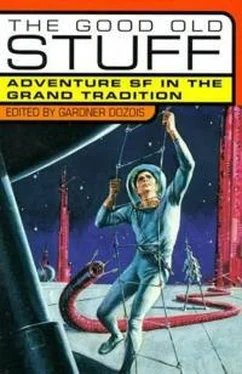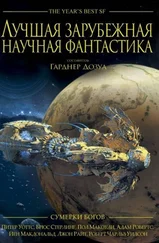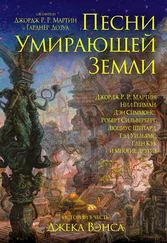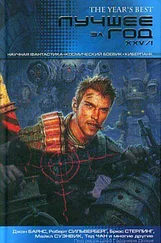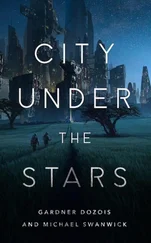Гарднер Дозуа - The Good Old Stuff
Здесь есть возможность читать онлайн «Гарднер Дозуа - The Good Old Stuff» весь текст электронной книги совершенно бесплатно (целиком полную версию без сокращений). В некоторых случаях можно слушать аудио, скачать через торрент в формате fb2 и присутствует краткое содержание. Год выпуска: 1998, ISBN: 1998, Издательство: St. Martin's Griffin, Жанр: Фантастика и фэнтези, на английском языке. Описание произведения, (предисловие) а так же отзывы посетителей доступны на портале библиотеки ЛибКат.
- Название:The Good Old Stuff
- Автор:
- Издательство:St. Martin's Griffin
- Жанр:
- Год:1998
- ISBN:0-312-19275-4
- Рейтинг книги:3 / 5. Голосов: 1
-
Избранное:Добавить в избранное
- Отзывы:
-
Ваша оценка:
- 60
- 1
- 2
- 3
- 4
- 5
The Good Old Stuff: краткое содержание, описание и аннотация
Предлагаем к чтению аннотацию, описание, краткое содержание или предисловие (зависит от того, что написал сам автор книги «The Good Old Stuff»). Если вы не нашли необходимую информацию о книге — напишите в комментариях, мы постараемся отыскать её.
The Good Old Stuff — читать онлайн бесплатно полную книгу (весь текст) целиком
Ниже представлен текст книги, разбитый по страницам. Система сохранения места последней прочитанной страницы, позволяет с удобством читать онлайн бесплатно книгу «The Good Old Stuff», без необходимости каждый раз заново искать на чём Вы остановились. Поставьте закладку, и сможете в любой момент перейти на страницу, на которой закончили чтение.
Интервал:
Закладка:
Grimp, however, slept on. It was going to take a little maneuvering to get him back into the village undetected before morning, but she would figure that out by and by. A steady flow of cool night-air was being drawn past them into the hollow now and rising out of it again in boiling, vertical columns of invisible heat. At the bottom of the deluxe blaze she’d lit down there, things still seemed to be moving about—but very slowly. The Halpa were tough organisms, all right, though not nearly so tough, when you heated them up with a really good incendiary, as were the natives of Treebel.
She would have to make a final check of the hollow around dawn, of course, when the ground should have cooled off enough to permit it—but her century’s phase of the Halpa War did seem to be over. The defensive part of it, at any rate-Wet, munching sounds from the pond indicated the pony felt comfortable enough by now to take an interest in the parboiled vegetation it found floating around it. Everything had turned out all right.
So she settled down carefully on her back in the long marsh grass without disturbing Grimp’s position too much, and just let herself faint for a while.
By sunrise, Grandma Wannattel’s patent-medicine trailer was nine miles from the village and rolling steadily southwards up the valley road through the woods. As usual, she was departing under a cloud.
Grimp and the policeman had showed up early to warn her. The Guardian was making use of the night’s various unprecedented disturbances to press through a vote on a Public Menace charge against Grandma in the village; and since everybody still felt rather excited and upset, he had a good chance just now of getting a majority.
Grimp had accompanied her far enough to explain that this state of affairs wasn’t going to be permanent. He had it all worked out.
Runny’s new immunity to hay-fever had brought him and the pretty Veld-lit to a fresh understanding overnight; they were going to get married five weeks from now. As a married man, Runny would then be eligible for the post of Village Guardian at the harvest elections—and between Grimp’s cousins and Vellit’s cousins, Runny’s backers would just about control the vote. So when Grandma got around to visiting the valley again next summer, she needn’t worry any more about police interference or official disapproval ....
Grandma had nodded approvingly. That was about the kind of neighborhood politics she’d begun to play herself at Grimp’s age. She was pretty sure by now that Grimp was the one who eventually would become her successor, and the guardian not only of Noorhut and the star-system to which Noorhut belonged, but of a good many other star-systems besides. With careful schooling, he ought to be just about ready for the job by the time she was willing, finally, to retire.
An hour after he had started back to the farm, looking suddenly a little forlorn, the trailer swung off the valley road into a narrow forest path. Here the pony lengthened its stride, and less than five minutes later they entered a curving ravine, at the far end of which lay something that Grimp would have recognized Instantly, from his one visit to the nearest port city, as a small spaceship.
A large round lock opened soundlessly in its side as they approached.
The pony came to a stop. Grandma got down from the driver’s seat and unhitched it. The pony walked into the lock, and the trailer picked its wheels off the ground and floated in after it. Grandma Wannattel walked in last, and the lock closed quietly on her heels.
The ship lay still a moment longer. Then it was suddenly gone. Dead leaves went dancing for a while about the ravine, disturbed by the breeze of its departure.
In a place very far away—so far that neither Grimp nor his parents nor anyone in the village except the schoolteacher had ever heard of it—a set of instruments began signalling for attention. Somebody answered them.
Grandma’s voice announced distinctly: “This is Zone Agent Wannattel’s report of the successful conclusion of the Halpa operation on Noorhut—” High above Noorhut’s skies, eight great ships swung instantly out of their watchful orbits about the planet and flashed off again into the blackness of the boundless space that was their sea and their home.
The Galton Whistle
L. Sprague de Camp
L. Sprague de Camp is a seminal figure, one whose career spans almost the entire development of modern SF and fantasy. Much of the luster of the “Golden Age” of Astounding during the late ‘30s and the ‘40s is due to the presence in those pages of de Camp, along with his great contemporaries Robert A. Heinlein, Theodore Sturgeon, and A. E. van Vogt. At the same time, for Astounding ’s sister fantasy magazine, Unknown , he helped to create a whole new modern style of fantasy writing—funny, whimsical, and irreverent—of which he is still the most prominent practitioner. (DeCamp’s stories for Unknown are among the best short fantasies ever written, and include such classics as “The Wheels of If,” “Nothing in the Rules,” “The Hardwood Pile,” and—written in collaboration with Fletcher Pratt—the famous “Harold Shea” stories that would later be collected as The Complete Enchanter .) In science fiction, he is the author of Lest Darkness Fall , in my opinion one of the three or four best Alternate Worlds novels ever written (it was reprinted in 1996, by Baen Books, bound in a package with David Drake’s To Bring the Light ), as well as the at-the-time highly controversial novel (although it now looks rather tame) Rogue Queen , and a body of expertly-crafted short fiction such as “Judgment Day,” “Divide and Rule,” “A Gun for Dinosaur,” and “Aristotle and the Gun.”
DeCamp may be primarily known today as a humorist, perhaps best remembered for the Unknown stories and the “Howard Shea” saga, but everything he writes has a strong element of fast-paced adventure to it—just as even the most headlong and swashbuckling of his adventure tales contains a generous portion of wry humor. His greatest contribution to the evolution of the Space Opera is the “Viagens Interplanetarias”—which means “interplanetary tours” in Portuguese, the language of the dominant political and economic power of de Camps future Earth, Brazil—sequence of stories and novels (sometimes also referred to as the “Krishna” series, after the name of the alien planet on which many of them take place), detailing the intricate and sometimes contentious interrelations that develop between Earthmen and the intelligent native species who inhabit the nearby regions of space.
Intelligence is a quality that suffuses every de Camp story, just as surely as does humor—de Camp’s Space Opera is just smarter than that of most of his contemporaries: you can see that a very shrewd mind is working out the background details and structure of what such an interstellar society would be like, and the consequences that would inevitably result, insisting on logic, rigor, and consistency even within the framework of the Interplanetary Swashbuckler (there’s no such thing as Faster Than Light travel in the Viagens universe, for instance—and that generates some inevitable and surprising consequences that few other authors writing a Space Adventure tale would have bothered to deal with ...). The intelligence of the conceptualization that went into the background of the Viagens stories shows up everywhere, not least in de Camp’s prediction that Brazil would be the dominant power on Earth by the middle of the 21st Century, the old superpowers having by then exhausted and bankrupted themselves—a prediction considered to be wild and extravagantly unlikely when de Camp made it back in the ‘50s, but one which seems increasingly credible these days, and one which makes the Viagens stories still look remarkably contemporary, in spite of being almost half a century old. Nor, in spite of all the intellectual rigor that went into them, are they the least bit solemn or slow—instead, they remain among the most colorful and vivid stories of Interplanetary Adventure ever written: as the sly and suspenseful story that follows will amply demonstrate.
Читать дальшеИнтервал:
Закладка:
Похожие книги на «The Good Old Stuff»
Представляем Вашему вниманию похожие книги на «The Good Old Stuff» списком для выбора. Мы отобрали схожую по названию и смыслу литературу в надежде предоставить читателям больше вариантов отыскать новые, интересные, ещё непрочитанные произведения.
Обсуждение, отзывы о книге «The Good Old Stuff» и просто собственные мнения читателей. Оставьте ваши комментарии, напишите, что Вы думаете о произведении, его смысле или главных героях. Укажите что конкретно понравилось, а что нет, и почему Вы так считаете.
